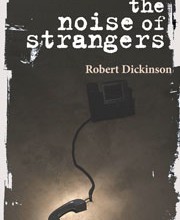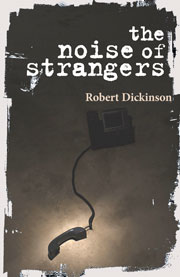
 Novel Review: The Noise of Strangers
Novel Review: The Noise of Strangers
Robert Dickinson and I have workshopped together quite a lot, and I was delighted to discover that he has had a novel published by Myriad – with typical modesty, he hadn’t told me!
What can I say about The Noise of Strangers? Well, that’s more difficult a question than you might imagine: it’s a novel very difficult to describe, but for good reasons, rather than bad ones. It’s dystopian fiction, but not apocalyptic. It’s set in the future, but not science fiction. It’s political, but not exactly a thriller, and it’s set in Brighton.
Yes Brighton. My own lovely, gaudy, city-by-the-sea has become, in Robert’s writing, a dim and severe place, full of paranoia, council departments become monolith power blocs and individuals trapped in sinister jobs, with hapless friends and a creeping sense that both jobs and friends are worse, in almost all ways, than they seem …
I recommend it to those who like complex fiction, who enjoy the demands of reading material that makes them think, and those who have a dry sense of humour – at the heart of this bleak, dark and all-too-believable novel of a near future we should fear to live in, is a joke so mordant and black, and so beautifully constructed and clever, that it will make you laugh out loud.
I asked Robert to unpick some of the complexities of his novel with me:
KLS. There’s a tension in the novel between the ‘domestic’ and the dystopian. It’s like watching somebody putting the kettle on the stove in a house that’s had its roof blown off by a bomb. I know somebody else asked about JG Ballard as an inspiration, but I’m wondering how you view Orwell – there’s a transparency about the prose (if not the plot) that seems very Orwellian to me.
RD. I first read 1984 when I was twelve, and working through the science fiction carousel at my local library. I remember reading the embedded essays about IngSoc and newspeak several times. It was the beginning of my political education, supplemented a few years later by the four Penguin volumes of his essays and journalism, which, for several years, I read and re-read until they became part of my mental furniture. When I started to write this novel I had to look at 1984 again just to make sure I hadn’t inadvertently included any direct quotations.
As for the influence on the style – yes. I took to heart his ideas about the use of plain language, not so much because of any moral authority he possessed but because they seemed reasonable. Obviously, with a novel you have more latitude than with a political tract, and there are occasions – such as the interleaved documents in The Noise – where different styles are required. I used a pared-down style in the narrative chapters to serve as a frame for the conversations and also because it seemed appropriate for the world it describes: a kind of austerity prose, formal and a little threadbare.
KLS. The novel has multiple points of view and, in truth, makes the reader work quite hard to fill in the gaps. I am entirely in favour of this, as I think reading shouldn’t be a passive experience, and I also think you get the balance about right between ‘showing’, ‘telling’ and ‘letting the reader work it out’ – how difficult was it to plot the novel so the reader had to exert themselves, but didn’t get lost on the way?
RD. In some ways it was the most difficult part. Here, after all, is a novel in which there are many off-stage characters, and the main characters are never described and are rarely present at important events. My intention was to evoke the claustrophobia and paranoia of the society, though I was aware it might just seem perverse and alienating. My hope was that the individual sections would be interesting enough to lure readers to try the next one, and then find they were caught up in the story. I spent what seemed a ridiculous amount of time changing my mind about which document (and which kind of document) should follow which chapter, and wondering about how little exposition I could get away with without becoming wilfully obscure.
KLS. You write from the point of view of several female characters in this novel (and I know from work-shopping with you, that you use the female pov quite a lot) can you explore what helps you decide why to view a scene through a male character’s eyes or a female’s?
RD. This could be a disappointing answer, but usually the perspective comes with the idea of the story. I started with a list of characters and ideas for scenes. My first instinct – certainly not yet a fully developed thought – was that the scenes, if I told them from any perspective at all, would be told from the women’s.
Looking back, I can claim that telling the story from their perspective gave me a more interesting angle of approach, or made a sharper contrast with the surrounding material, or added to the atmosphere of impending violence. It may have done all those things, but the starting point was hardly more than an intuition.
KLS. I think we have to talk music, just because it never appears in the novel! And the feeling this novel gave me was of a Tom Waits album, with a story being played out in a variety of tempi and through a range of instruments. Is that anything like the concept you had in your head, or am I being a pretentious reviewer (actually those are not mutually exclusive) and what did you listen to – if anything – while writing this novel?
I usually try not to listen to anything while I’m actually writing. If I’m typing up a draft or changes to a draft I will have music on in the background, sometimes actually by Tom Waits, who I’ve liked since Swordfishtrombone. Or something loud and fast. Elsewhere my tastes are classical and fairly conservative.
The musical analogy that occasionally occurred to me while writing was that of a baroque suite of characteristic pieces, where a Courante follows a Gigue or a Saraband and the only connection between them is the shared tonality. Or a set of variations where a fragment of melody can become a Viennese waltz, a foxtrot, or a funeral march. There may also have been a subliminal influence from works like Bernard Stevens’ Cello concerto or Elizabeth Maconchy’s string quartets – austere, astringent mood music. For all these putative musical considerations the only tunes that get a mention in the novel are hymns, some of which I imagine would be sung in a style not unlike Waits’ best drunken tramp manner.


Recent Comments